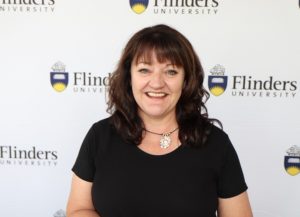
Flinders Caring Futures Institute researchers have helped steer the co-design, implementation and evaluation of oral healthcare interventions for older adults in hospital.
“It’s a significant problem, because poor oral health carries an increased risk of systemic infection and malnutrition – so it therefore impacts older people’s overall health, psychological health, quality of life and wellbeing,” says Dr Joanne Murray, from Flinders’ College of Nursing and Health Sciences.

“However, unfortunately oral healthcare intervention in healthcare institutions is often not realised. Oral healthcare is described as one of the most missed aspects of fundamental care in hospital.”
Dr Murray has been driving several important clinical and community partnerships that approach different aspects of often overlooked oral healthcare.
Her current funded project – “Getting better after stroke: Implementing the Screen-Clean-Hydrate protocol” – brings together stroke guidelines for swallow screening, oral healthcare and hydration in hospitals to improve the health and wellbeing of stroke survivors.
“The protocol will be co-designed with and implemented in two South Australian acute strokes units – at the Lyell McEwin Hospital and Flinders Medical Centre – to improve care processes in line with Australian stroke guidelines,” says Dr Murray. “It will also reduce hospital-acquired complications for stroke survivors, which will lead to better health and recovery outcomes.”
This project – led by Dr Murray with Flinders colleagues Associate Professor Sebastian Doeltgen, Professor Stacey George, Professor Gillian Harvey, Sulekha Gunasekaran and research collaborators Dr Matthew Willcourt, Kathleen Parr, Chris Dry and Jana Havlis – has been made possible by a $78,000 grant from The Hospital Research Foundation. It commenced in March 2022 and is due to be completed in September 2023.
It follows another oral healthcare project for older people steered by Dr Murray during 2022. REDUCE (tRanslating knowlEDge for fUndamental CarE) identified gaps between current oral healthcare practice and recommended evidence-based practice for older people in hospitals, along with developing tailored multidisciplinary strategies to improve the adherence of evidence-based oral healthcare in hospitals.
This was the result of another valuable collaboration between Flinders’ Caring Futures Institute with SA Dental and the Southern Adelaide Local Health Network (SALHN), implemented with assistance from the staff and patients of the Whittaker GEM Unit at Noarlunga Hospital.
It identified important gaps in current oral healthcare practice, which helped shape strategies to sustain better oral healthcare and develop new oral healthcare resources that best suit the needs of hospital-based clinicians.
This project was made possible through the support of SA Dental, both through a grant of $20,000 and their development of education materials including the recently published brochure Good Oral Health and Healthy Ageing, issued by SA Health. This brochure covers tips and techniques to care for natural teeth and dentures, advocates quitting smoking, explains tooth-friendly eating and drinking, and encourages professional dental assessment.
“Providing reliable and effective daily oral healthcare by hospital staff is not straightforward. It requires a multifaceted, interprofessional strategy underpinned by implementation science and knowledge translation principles,” says Dr Murray.
The project report – ‘REDUCE (tRanslating knowlEDge for fUndamental CarE) missed oral healthcare: it takes a team’ by Dr Joanne Murray, Dr Sarah Hunter, Dr Tiffany Conroy, Prof Alison Kitson, Zita Splawinski, Heather Block and Dr Adrienne Lewis – has just been released, which found that to make impactful and sustainable change, it was important to make both system and local-level changes, while maintaining a flexible mind-set about how this can be achieved.
Sustained change requires deliberate alterations in clinical governance structures and actions across multiple levels of an organisation and involving multiple disciplines, rather than being dependent on changes in the beliefs or intentions of individual staff members. However, implementation strategies may need to be agile and involve the right people for the right tasks at the right time. The researchers say it is important to identify these people so they feel empowered and have agency within their circle of influence.
“At the local level, individual health practitioners and managers may require simple step-by-step action plans to be empowered to make change,” says Dr Murray.
The research has also led to the introduction of a short course developed by SA Dental for SA Health – Better Oral Health in Hospital – that provides hospital healthcare professionals with recommended oral care techniques, aids and products used to maintain good oral health for patients in the hospital setting.
Additionally, the best practice oral healthcare guidelines developed by this project are being considered by the National Commission on Safety and Quality in Health Care, with a view to have oral healthcare included as a National Safety and Quality in Health Care Standard for the acute care sector in the future.
“Our advice to future researchers and clinicians wishing to make practice change is to start local but think global,” says Dr Murray. “Even if change does not seem transformative at a local level, the impacts may occur and continue to ripple further afield.”

